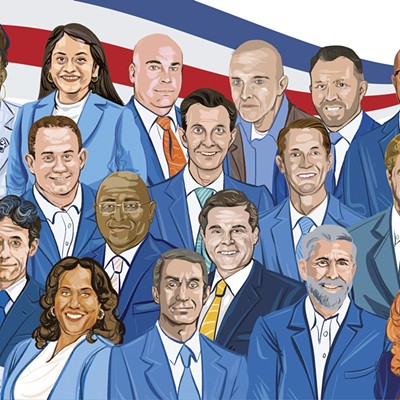Thursday, February 19, 2009
Mad About the Boy
When announcing his candidacy today, Pat Dowd offered up an intriguing role model for the kind of mayor he'd like to be:
Following in the footsteps of a mayor that I've come to admire as a result of the people that I've met and heard stories from -- Pete Flaherty -- I stand here today to say that I am 'Nobody's Boy.' I'm just like that -- nobody's boy.
Of course, in a campaign where your rival is 29 years old, it's never a bad thing to use "boy" in the pejorative sense. Especially when you plan to run on a platform of reform and transparency, and accuse your opponent of being in the back pocket of campaign contributors.
But as Flaherty's own political career suggests, being nobody's boy can get pretty lonely. And in any case, some of the youthful supporters in Dowd's audience probably had no idea who Dowd was talking about. Or if they did, they remember Pete Flaherty when he was, in fact, Somebody's Boy: In the waning days of his political career, Flaherty was the quiet yes-man to county commissioner Tom Foerster -- whose name is practically a synonym for "Democratic machine."
In any case, Flaherty earned the "Nobody's Boy" appelation as mayor of Pittsburgh, from 1970-1977. And to a large extent, it's easy to see why Dowd would want to adopt the monikker for his own.
For one thing, Flaherty's tenure as mayor was defined by independence, sound fiscal management, and taking a hard line on expenses. As urban historian Roy Lubove writes in Volume 2 of his excellent Twentieth-Century Pittsburgh:
Flaherty had distanced himself from the Democratic party machine and run as an independent. He also distanced himself from the Allegheny Conference and corporate community. Flaherty was less concerned with corporate-driven development than with fiscal discipline, lean municipal government, neighborhood improvement, and reducing the tax burden of the ordinary citizen.
Lubove credits Flaherty with "balanced budgets and reductions in taxes and the municipal payroll [that] were an anomaly in the twilight years of the Great Society." It was, he contends, a prototypical rightsizing initiative -- "an early effort to adapt municipal government in Pittsburgh to demographic realities." Flaherty's devotion to fiscal discipline meant defying unions, and cutting the city work force from 7,000 to a little more than 5,200. He also embodied a backlash against the city's first Renaissance, which by the 1970s had lost much of its sheen. Flaherty argued that previous administrations had focused too much on developing Downtown, ignoring the neighborhoods.
All of which is going to sound pretty good to many voters today. What's more, those attributes jibe with Dowd's own personality, and with the circumstances of his campaign. He's not going to get much support from labor, or the business community, or other politicians, after all. And it's a lot more palatable to be "nobody's boy," when you suspect no one wants to adopt you anyway.
In other words Dowd -- who taught history not long ago -- has picked a smart, fitting historical antecedent for his campaign. Older voters will appreciate the reference especially, as they recall the happier days of yesteryear ... when the steel industry hadn't quite begun its swan song, your kids stayed in town, and no one you knew owned an imported car.
But a note of caution: There's a fine line between being "nobody's boy" and being the red-headed stepchild. And Flaherty's own tenure in city government suggests a potential downside.
To quote Lubove again: "To some extent, Flaherty translated personal idiosyncracy into public policy," and he had "a near obsession with independence and autonomy" that sometimes tripped up himself and his city. Flaherty's go-it-alone style resulted in long and fractious debates with county officials and other leaders, helping to precipitate the Skybus fiasco and endless debate over the old David Lawrence Convention Center, until the state nearly threatened to pull funding for the project.
Arguably, this side of Flaherty jibes with Dowd's personality too ... and in a less reassuring way. Dowd has played a fractious role on city council, to the extent that even natural allies -- like Doug Shields and Bill Peduto -- have expressed frustration with him. Bloggers too have been vexed by Dowd's idiosyncrasies:
Which Pat Dowd will show up to campaign? The earnest door knocker who listens to each constituent? Or the guy who stands up at the Council table and argues that other Council members should not get paid for their legal bills (even though they were helping Dowd out with that Lamar sign appeal) because they didn’t ask for money ahead of time?
Time will tell which Dowd shows up to campaign, of course. An equally interesting question, perhaps, is which side of Pete Flaherty would Dowd channel if he has a chance to govern?
Tags: Slag Heap









